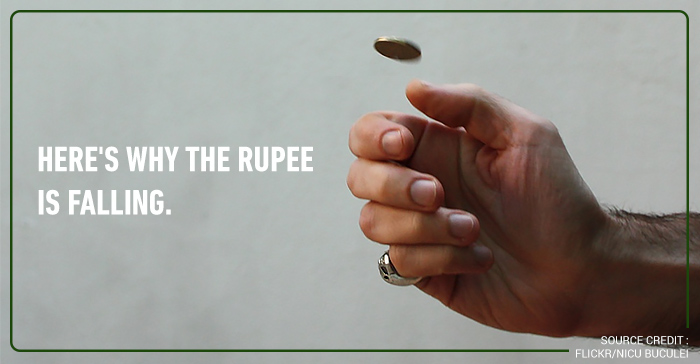7 Questions we need to ask about the fall of the Indian Rupee

Market volatility is nothing new; with the increasing variations and fall of the rupee in the market, many Indians are left exhausted due to its effects on price rise, inflation and increased interest rates.
Let’s look at the reasons behind this and understand what is making the Indian rupee more vulnerable every time:
To start off; how do we know that the rupee is falling?
This can be forecasted from the Current Account Deficit (CAD), foreign exchange inflow rate, domestic inflation rate, interest rates of funds and other government policies.
It also depends on the economy of other countries.
By analyzing these factors one can try to get a decent idea and foresee the possible rupee’s fall or rise.
How do Federal Reserve actions play a role in this?
The foreign exchange rate for conversion of currencies completely depends on the current market scenario and the exchange rate of different countries.(Increase in exchange rates means Indian currency is depreciating and the Dollar is gaining more value.)
In contrast, whenever the exports rise and there is more inflow of currency, the rupee starts strengthening.
Earlier, most countries used to have a fixed exchange rate at which they could exchange but this system was discontinued in order to stay far from the risk of currencies declining.
How does Inflation affect it?
The difference between increase in money flowing to other countries from India can cause a surge in inflation. The more money goes to other countries, the more the economy is pulled down.
In this case, deflation will not be of much help if the price of commodity and other goods don’t fall. Also, if you’ve a fixed interest rate then you’ll have to bear a higher valuation of debts and loans.
What is the link to high gold import demands?
When the price of gold is cheaper, internationally, most Indians try buying as much as they can which ultimately increases the demand from gold importers. Hence, they are importing more gold than ever and this is causing gold prices to fluctuate.
Does the increase in the demand for imported products affect it?
The value of currency largely depends upon the import and export of goods like clothes and gadgets; this boosts foreign currencies, resulting in the fall of the rupee.
What are the effects of the fall in Rupee?
As India gets 80% of its crude oil imported owing to increasing requirements: the weaker rupee would affect our import bill and oil companies will increase their petrol and diesel prices.
This inturn would result in us paying more at petrol pumps and also make transportation costlier, resulting in costlier goods.
It also automatically impacts your foreign education as you will end up paying more for your education abroad due to the fall of the Indian currency. Or, if you had planned a vacation abroad, then your air tickets, travel insurance, hotel tariffs, shopping and other additional cost would go up.
How can we control this?
Decrease in the usage of imported items like many foreign brands for clothing and electronics can help.
To an extent, if we neutralize the buying of gold and other non-essential items then it can relax the burden on the forex department and wouldn’t worsen the CAD (current account deficit), which is getting more bleak.
Given an estimate that we siphon around approximately Thirty thousand Crores abroad in exchange for products like cosmetics, food & beverages, tea, etc; consumption of indigenous goods, use of public transport and innovative products should be implanted to minimize the consumption of fuel and natural gases.
The fall of the rupee affects the common man. Businesses relying on imports are hit hard and forced to pay more which results in citizens paying more. To help curb the decline of the Indian currency, it is important to understand it and know how we can tackle it so people are not paying more than they can afford for goods and services.
Share your thoughts and views with us by writing to jaagorein@gmail.com or tweet to us @JaagoRe.
More about the Author:
Share this story on






